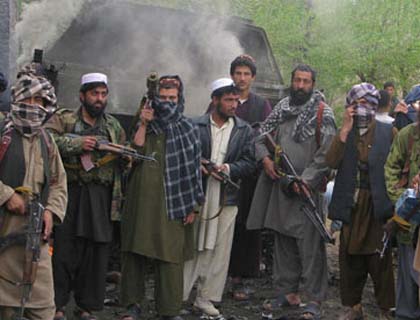The approach of Mr. President Karzai has always been questioned by experts and civil society in regard to peace talks with Taliban-led militants. From the very start, Mr. President has upheld a kind of mild diplomacy towards his armed oppositions and strongly supported non-military steps to end the ongoing instability and security crisis. There were reports even about his earlier meeting with Taliban militants in Kandahar, the capital of Emarat-e-Islamic—the name Taliban militants call their political establishment— after outstation of the regime and discussed about conditions of possible joining to the so-called peace process. But seemingly Taliban leaders refused to join and accept conditions of foreign involved countries.
There was nothing that Mr. President Karzai could do for them but defectors were strongly welcomed by him and hold key posts within the current political establishment. No one can dare to open mouth in opposition and ask former Taliban high ranking officials about tens of thousands of people killed during the regime.
Perhaps, many can remember when the first Loya Jirga—the grand traditional assembly—was called by Mr. President and there, participants approved holding peace talks with militants on condition that they had to lay down arms and accept the constitution. And, if they joined, they would be forgiven and wouldn't be persecuted, no matter what positions they used to have in Taliban establishment.
Taliban leaders made mockery of the Jirga which holds high reverence among Afghans, particularly, Pashto speaking community, saying that the conditions were much more like call for surrender not for talks. Even that time I wrote Taliban was right because the Jirga approved nothing visible to entice them to join the government. The only thing participants counted on was protection of anyone who lays arm, accepts the constitution and joins government. Was that new? Of course not!
After the very collapse of the Taliban regime in 2001, through foreign military intervention, Kabul officials clearly explained for all militants that they could join government without fear of persecution and, more importantly, they would be appointed in key administrative posts. There are a lot of examples about Taliban defectors who are still suspicious of maintaining linkage with former colleagues, but work in quite important positions. They are holding mouthwatering posts and no institutions dares to question their dark profile.
Let's put it this way. Taliban militants have had no problem in joining the democratic process. Elements that showed interest were highly welcomed. But one striking turn occurred in late 2009, and that was disappointment of foreign allies for success of military strategies. Indeed, years of engagement without clear prospective about victory made many foreign allies to reassess their military strategies and search for alternatives. One of those alternatives was of course the so-called Afghanization of the mission, which was generally interpreted as transferring responsibilities to Afghan people and giving them authority to take their destiny in their own hands.
This process provided Mr. President to stamp on a policy which he maintained and pushed for, perhaps, from the very start of anti-insurgency struggle in 2001. Thereafter, he has held bold steps to make deal with Taliban militants. He publicly calls them as dissent brothers and even circles around him philosophize that Taliban has changed dramatically from what they used to be. It is not a very unfamiliar statement in domestic press that if Taliban recaptures power and end to current ruling establishment, they would not rule the country as they did.
Probably, they allow girls to go to school and observe human rights, specifically, women rights to some extent. These claims are made with such certainty that leads to false assumption among common civilians.
I do not know why such bogus claims are made. Is it due to efforts made by circles within and out of the government in order to draw a more acceptable picture of Taliban militants and the regime they would establish?
And I leave the answer for you, but there is one thing that I can assure you about it and that is "Talibanism and Human Rights" are contradictory that wouldn't approach each other at all. If it be true, as some claim, that militants have changed, what is the problem? Why they avoid joining the current administration which would shed tears to welcome them?
Perhaps, what hasn't changed and wouldn't is the Taliban stance and their conditions. From the very start, they vowed to target the members of High Peace Council and would not talk with Kabul government because, according to them, it is unauthorized.
Instead, what has changed and will become more flexible is the administration's position. Recently Masoom Stanikzai, a key figure in the current High Peace Council put the change of constitution, the move which was interpreted as green signal to militants which assumes the establishment un-Islamic. Many experts believe that the statement showed the willingness of the government to compromise on articles which do not accord with the ideology of militants.
So, such flexibility and compromise have stoked harsh criticism as the leader of National United Front (Jebhe-Motahed-e-Melli) and the former first vice-President, Ahmad Zia Masood, blamed Mr. President for having ties with militants. In a conference in Kabul on April 20, he alleged that branding militants as dissent brothers indeed was sign of Karzai's lasting relationship with militants.
He added that government wanted to find a new vote bank through drawing militants to the power. Because the administration has lost its traditional public status and if a candidate is nominated by it, he wouldn't succeed unless he depends much on the muscle of Taliban-led militants.

